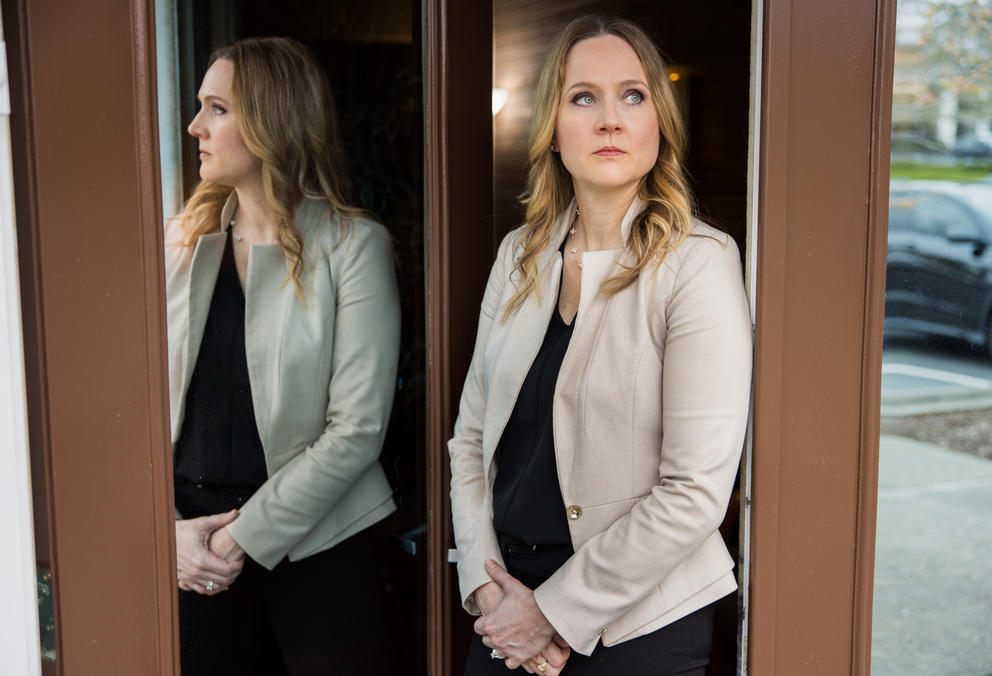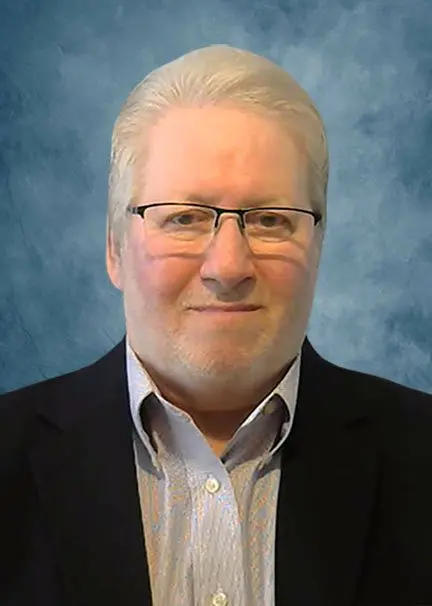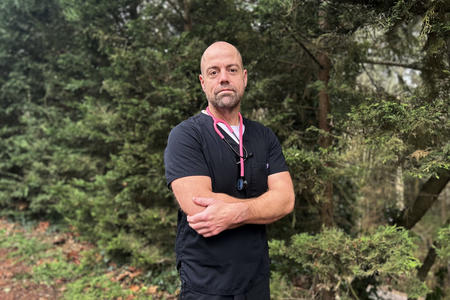The next month, it happened again. And again. As Weelborg began to take a harder look at Synergia and Hirsch, she learned that other workers weren’t being paid, either. In fact, Hirsch had a decades-old history of failing to pay workers.“I will never again sign a contract without talking to former and current employees and verifying who they are,” Weelborg said. But she also wondered, “Why wasn’t there some sort of visibility on this person? Why did this go unchecked?”
InvestigateWest spoke with 10 current and former workers of Hirsch’s companies who said they had been paid just a portion or none of what they were owed for their work. One person said she was shorted tens of thousands of dollars. Their estimates, combined with claims in a lawsuit from the early 2000s, suggest Hirsch has potentially failed to pay workers at least $125,000 over the years.
InvestigateWest (invw.org) is an independent news nonprofit dedicated to investigative journalism in the Pacific Northwest.
Three patients, meanwhile, told InvestigateWest that poor communication from Hirsch’s telehealth practice had led to missed appointments and lapsed prescriptions, all while they dealt with unexplained bills and charges. To verify patients’ and workers’ stories and to learn more about Hirsch and his business dealings, InvestigateWest also reviewed dozens of court records, bills, contracts, emails and other documentation.
The issues at Synergia raise broader questions about the oversight of telehealth, which has rapidly expanded during the pandemic. Some federal agencies have scrutinized companies over alleged fraud and concerns that some prescribers are improperly doling out drugs. Less attention has been paid to the business practices of these companies, which often hire workers from around the country as independent contractors.
Washington state agencies, including the Department of Labor and Industries and the Department of Health, were aware 18 years ago of Hirsch’s behavior and how it upended practitioners’ and patients’ lives, records show. But when asked about their role in Hirsch’s ability to open a new business and what action they could take in light of the new accusations, most agencies punted, pointing to potential regulatory gaps that have allowed Hirsch’s pattern to continue.
Independent contractors such as Weelborg, for example, aren’t subject to all of the same wage protections as employees, Labor and Industries said, and the Department of Health doesn’t regulate private practices like Synergia unless they fit certain criteria, such as seeking Medicaid reimbursements or looking to provide court-appointed drug treatment, according to a spokesperson.
State Rep. Marcus Riccelli, D-Spokane, co-sponsored a 2021 bill passed into law that was meant to protect access to audio-only telehealth services. In an interview with InvestigateWest, he expressed concern about Synergia’s practices and the lack of regulation to protect workers or telehealth patients.
“The Department of Health piece kind of surprises me,” Riccelli said. “We want to create more access, but we also don’t want bad actors.”
Hirsch, 72, declined an interview request from InvestigateWest for this story. He canceled an appointment booked by a reporter on his publicly available calendar, saying he was recovering from a heart procedure, and did not respond to a follow-up email with a list of detailed questions about the allegations in this story.
“I will not be speaking with you — go ahead and write your report as you see fit,” Hirsch wrote in an email.
A troubled history
Several current and past workers said they weren’t paid for the work they did with Synergia.
One nurse practitioner was paid for only two of the five months he contracted with Synergia in 2020. Another worker, a therapist, received a single $252 payment from Hirsch. She said she is still owed $4,494.
Elizabeth Willner, a single mother who worked part time for three months on top of her full-time job, never saw a cent, though she and Hirsch signed a contract stipulating her $18.50 hourly wage.
“I remember telling my current co-workers that I thought I found my dream job,” Willner said. “To not only get no compensation, but also give all of the time from my family to this man and not be compensated for it was devastating.”
Back in the early 2000s, employees of Hirsch’s at his clinic, called Primary Behavioral Health Network, experienced strikingly similar problems to what Synergia workers are facing today. They sought the help of state oversight agencies, spoke to the media and even took Hirsch to court — but none of those actions prevented Hirsch from building his career in telehealth and, decades later, repeating the pattern with a new business.
Dr. Stan Abramski, a physician who worked part-time for Hirsch for several months in 2004, said Hirsch asked police to remove him from the Seattle clinic’s property when Abramski tried to ask him in person about the $11,000 missing from his paychecks. Elaine Ackerman, who worked at the clinic for a month in 2005, said Hirsch also called the police on her when she confronted him at the office over her bounced paycheck.
“This is a game he’s played for a while, and obviously he’s honed his skills even better now that he’s gotten into telepsych,” Abramski said.
Abramski was one of eight workers who sued Hirsch for a total of nearly $92,000 in unpaid wages in 2004. In a December 2005 KOMO article, the Seattle TV station said it heard from as many as 40 of his employees who said they were owed money. The Department of Health had received 13 complaints about Hirsch, while Labor and Industries said it had received 10 complaints, according to the article.
The plaintiffs in the lawsuit against Hirsch were awarded a judgment of double damages, almost $184,000.
After the judgment, however, Hirsch and his wife declared bankruptcy, and Primary Behavioral Health Network closed. Abramski and another plaintiff told InvestigateWest that they never received any money from their case.
It’s unclear what action Labor and Industries took in response to those complaints. A spokesperson said any records detailing the results of the 2005 complaints would require a records request to retrieve them. InvestigateWest requested the records, but did not receive them by deadline.
The state Department of Health, meanwhile, did take action against Hirsch in 2004 and 2005 in response to a few of the complaints about Hirsch prescribing medications while his license was expired. The Department of Health substantiated those reports and suspended his license indefinitely. Hirsch met the requirements to restore his license in June 2021, but did not reactivate it, the department said. It remains expired.
But Hirsch’s suspended license didn’t prove to be a barrier to his transition into telehealth, where he emerged as an influential voice.
Hirsch became involved with the American Telemedicine Association, a membership organization that helps train organizations to deliver telehealth and advocates for industry-friendly policies. He is listed as a member of a work group that produced the association’s Practice Guidelines for Video-Based Online Mental Health Services in 2013.
For practitioners such as Weelborg, seeing Hirsch’s name associated with the American Telemedicine Association was a marker of legitimacy, a “bona fide green light” to find when she was considering working with Hirsch.
The American Telemedicine Association did not respond to questions about what it knew of Hirsch’s background or the fact that his license was suspended while he was part of that work group. A spokesperson said he had not been a member of the association for several years.
Synergia workers shared their annoyance at how difficult it was to find evidence of Hirsch’s troubled business history.
“Those of us that do a little due diligence, we don't find this stuff, and we find things that look legitimate,” Weelborg said. “That makes me frustrated, for sure.”
Workers weren’t the only ones who missed things in Hirsch’s past. Doug Moore, a Portland-based executive with a national construction company, said Hirsch’s pitch to expand telehealth access was particularly effective during the early days of the pandemic. He was one of at least a half-dozen investors who helped get Synergia up and running in early 2020, and once sat on the company’s board of advisors.
Moore said he probably didn’t look deeply enough at the psychologist’s history before deciding to invest.
“I would not have, had I known,” Moore said of Hirsch’s bankruptcy, wage-theft complaints and suspended psychology license.
That Hirsch is still operating in behavioral health, not paying practitioners, and roping in patients suggests Washington’s consumer protection and regulatory agencies either failed or haven’t been properly equipped, said Ackerman, the former Primary Behavioral Health Network employee.
“I don’t know who he thinks he is, but the hammer needs to come down, really hard and really fast, because he’s ruining lives,” Ackerman said. “If the point of a regulatory body is to protect the citizens of the state of Washington … and nobody’s actually doing their job because [Hirsch] is getting away with everything under the sun for decades, then why do we actually have these bodies?
“It just makes my skin crawl.”
Cascade Medical in Leavenworth was one of several clinics that referred patients seeking behavioral health services to Synergia Integrated Telebehavioral Health in 2022 and 2023. A representative for Cascade said the clinic terminated its referral relationship with Synergia after learning of negative patient and provider experiences. (Cascade Medical)
Left in the wake
Synergia Integrated Telebehavioral Health, which Hirsch first registered in Washington in February 2020, has established referral relationships with at least three clinics. In 2020, Synergia clinicians treated veterans through a referral partnership with a Veterans Affairs contractor called TriWest Healthcare Alliance. More recently, patients were referred from two primary care clinics in rural Washington: Ridgefield Family Medicine in Ridgefield and Cascade Medical in Leavenworth.
TriWest and the Ridgefield clinic did not respond to requests for interviews. Cascade Medical, however, through a spokesperson, confirmed that it had gone through a standard background process to vet Synergia’s ability to meet its patients’ needs.
That vetting, according to Public Relations Director Clint Strand, involved checking the “legal, logistical and clinical aspects of the practice … but does not include personal backgrounding for administrators.”
Several patients said they had experienced problems with communication and unexplained billing that, for some, seriously impacted their lives.
Monica Velez, who was referred from Ridgefield Family Medicine last December, lost access to Adderall for three weeks when her regular pharmacy couldn’t fill her prescription amid a nationwide Adderall shortage. She tried multiple phone numbers, but was unable to get a call back from Synergia staff to get her prescription transferred to a pharmacy that could fill it.
Going on and off the medication so rapidly took a toll on her mental health, she said.
“My work performance suffered extremely,” she said. “I stopped being able to get out of bed again, stopped being able to focus on the work I was doing, being able to clean my house, do my laundry, organize my paperwork.”
Grant Wagman, who was referred to Synergia through Cascade Medical, was charged by the company for missed appointments even though he said Synergia repeatedly failed to send login information for his appointments, forcing him to play a game of phone tag similar to the one Velez had.
When Bob Martin began seeing Weelborg last October, he and his wife Judy had no remaining deductible, no copay and no coinsurance — Regence, their insurance provider, was paying in full, according to the documents the company sent the couple. But even so, Judy Martin noticed in December that Synergia began charging directly out of their joint bank account.
Judy called three times, but could not reach anyone at Synergia for an explanation of the charges.
The Martins’ bank managed to claw back the money and block Synergia from pulling any further charges. The telehealth company had attempted to charge the couple more than $500.
Regence, meanwhile, paid more than $1,700 to Synergia for Bob’s treatment, according to the explanation of benefits sent by the insurance company. Weelborg has not received any of that money.
Philip Hirsch, a psychologist from Shoreline, was sued in 2004 by 11 employees of his Seattle clinic who said he had failed to pay them. Despite a $184,000 judgment against him in that lawsuit, his bankruptcy, and the 2008 loss of his psychology license, Hirsch built a reputation in telehealth and opened Synergia Integrated Telebehavioral Health in early 2020. Seven workers now say he hasn’t paid them, either. (Synergia Integrated Telebehavioral Health)
Regulatory limitations
Asked about their abilities to protect workers and patients from Hirsch’s alleged behavior, Washington’s agencies charged with consumer protection and employer oversight mostly pointed to limitations on their authority. Washington’s Department of Labor and Industries, for example, is responsible for investigating wage-theft complaints against employers. Depending on its findings, it can compel employers to pay wages owed and issue fines.
Matt Ross, spokesperson for Labor and Industries, said the agency had received just two wage complaints against Synergia. The first was in 2022 and was closed after Labor and Industries determined the worker was an independent contractor.
The second complaint, filed this March, was withdrawn by the worker; Labor and Industries indicated the employee would need to file the claim in Georgia, where the worker was based.
Complaints are the main catalyst for the agency to investigate and take deterrent action against employers such as Hirsch, Ross said.
“There are cases where [Labor and Industries] can initiate proactive investigations, however, it is primarily a complaint-driven process, particularly in the area of back wages,” Ross wrote in an emailed response.
In some instances, Labor and Industries refers cases with multiple wage-theft claims against a business to the Attorney General’s Office for a joint investigation. Attorney General Bob Ferguson has prioritized prosecuting employers for wage theft, and in 2017, successfully pushed legislation to prohibit government agencies from awarding contracts to employers who have violated wage-theft laws.
A spokesperson for the Attorney General’s Office, however, referred a reporter to Labor and Industries for questions about wage theft and did not respond to questions about the consumer protection unit’s role in investigating patient experiences such as Martin’s.
The Department of Health, meanwhile, licenses certain behavioral health agencies, such as residential treatment facilities and psychiatric hospitals, but does not have licensing authority over private practices such as Synergia, a spokesperson said. Individual practitioners who provide treatment to patients are required by law to be licensed, but Hirsch’s currently expired license doesn’t bar him from his administrative role with Synergia.
Weelborg said she made a report to the Federal Trade Commission but hasn't received any response yet. Beyond an investigation into national telemental health company Cerebral over allegations of deceptive marketing practices, the Federal Trade Commission hasn’t devoted much attention to telehealth.
Telehealth use skyrocketed during the pandemic — the number of telehealth users in 2020 was 13 times greater than in 2019, according to the federal Pandemic Response Accountability Committee. Relaxed rules around the billing of federal programs and prescribing without an in-person visit during the public health emergency also opened new doors for fraud, however.
The Department of Justice has successfully prosecuted dozens of people over billion-dollar telefraud schemes since 2020. Meanwhile, the Department of Health and Human Services is warning practitioners to be cautious about getting involved with telemedicine companies.
Last July, the agency put out a special fraud alert that noted common high-risk indicators that a company is looking to fraudulently bill Medicare, Medicaid and other federal programs.
While failing to pay clinicians isn’t one of those indicators, Alex Van Landingham, senior counsel for Medicare policy in the HHS Office of Inspector General, said he’s seen a lot of people “who answer a job alert and quickly realize they’re part of a fraud scheme.”
States are also beginning to take a more critical look at at least some portions of the industry. Washington state Rep. Riccelli’s 2021 bill mandated an evaluation of telehealth services including behavioral health — but will focus specifically on audio-only telehealth. A spokesperson for the Washington Health Care Authority said that work includes using surveys of insurance providers to get their assessment of fraud and waste. The report is due by this November.
Riccelli said he believes in the importance and usefulness of telehealth, particularly for rural areas, but he wanted to see more applicable information from Washington, including qualitative data, that would show how prevalent fraud and waste are.
“I have a lot of questions as we move forward,” he said. “It’s quite possible there’s a [regulatory] gap.”
Hopes for exposure
Weelborg has been trying throughout the spring to spread the word about her and her colleagues’ experience with Hirsch. And to some extent, those efforts have sparked results.
Cascade Medical, for example, canceled its contract with Synergia in March after learning from Weelborg about the communication issues patients were facing and the fact that clinicians were not being paid.
“The quality of behavioral health care our patients received through Synergia is not in dispute,” wrote Strand, the public relations director. “Our concerns stemmed from the above allegations of administrative and financial challenges. Once we were made aware of those issues, we made the decision to seek other partners in telebehavioral health.”
Weelborg said she’s contacted the insurance companies Synergia has been credentialed with to let them know they might want to review Synergia’s claims over the last six months.
She also has filed a small claims suit against Hirsch for $3,500. Another former contractor said she is also filing a suit of her own.
She, like the other workers who spoke to InvestigateWest, wants future workers or patients to know what they might get mixed up in before associating with Hirsch’s businesses.
“I know I’m not going to see any money. That’s not why I’m doing it,” Weelborg said. “It’s extracted other resources from me, but if this all comes to him not doing this again, it’s been worth it.”
Hirsch, meanwhile, has continued to post on his company’s LinkedIn page, trying to recruit new primary care practices.
“SYNERGIA is a pioneer in delivering integrated telebehavioral health services at no cost to you,” a post from April 13 read. “Please let us know if we can schedule a Discovery Call with you.”
InvestigateWest (invw.org) is an independent news nonprofit dedicated to investigative journalism in the Pacific Northwest. Reach reporter Kaylee Tornay at kaylee@invw.org.










